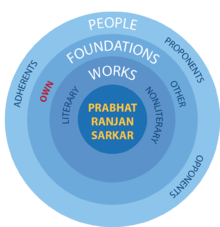Prevention of Cruelty to Animals and Plants
| Prevention of Cruelty to Animals and Plants | |
|---|---|
 | |
| Abbreviation |
PCAP (pronounced "pee-cap") |
| Formation | 1977 |
| Founder(s) | Prabhat Ranjan Sarkar |
| Type | Non-governmental organization |
| Legal status | Foundation |
| Website | www.pcap.ws |
| Location in Sarkarverse |
 |
Prevention of Cruelty to Animals and Plants or PCAP is an international non-governmental social organisation and a sub-organisation of Ananda Marga Pracaraka Samgha that aims to prevent cruelty to animals and plants.
History
Prevention of Cruelty to Animals and Plants (PCAP) was founded by Prabhat Ranjan Sarkar in 1977. In 1982, Sarkar wrote a book on his philosophy Neohumanism, that laid the philosophical and inspirational basis for the implementation of the objectives of PCAP.[1]
Objectives
PCAP have the following ten aims and objectives—[1]
- To prevent cruelty to animals and birds.
- To protect rare and dying species of animals and birds from extinction.
- To prevent cruelty to plants and trees and to protect rare and dying species of plants and trees from extinction.
- To prevent deforestation and create and maintain ecological balance in relation to environments.
- To create a sentiment of love for animals, birds and plants by popularizing their usefulness to human beings, society and the environment.
- To popularize the vegetarian menu and thus save the lives of innocent animals and birds.
- To provide food to animals and to provide sanctuaries and medical help to ailing and sick animals and birds.
- To promote forest based products and industries for the economic upliftment of the poor, tribal and forest people.
- To construct and maintain sanctuaries, aviaries, ponds, wells pastures, gardens and forests, for the welfare of human beings, animals, birds and plants.
- To promote and develop afforestation in order to convert dry and barren lands into fertile and cultivable ones.
Vision
PCAP wants to create a world where human beings realizing their higher natures assume their sacred role as stewards of the Earth to love, serve and protect all livings and non-living beings on the planet.[1]
Mission
PCAP has states their mission statement as—[1]
To work for the all-round emancipation of all beings under the guiding principles of Neohumanism. To ceaselessly endeavor to show human beings the path to higher consciousness that will lead them out of their present ills of narrowness, meanness and selfishness. To create practical models of sustainable rural eco-communities where humans, animals and plants live in harmony and cooperation under the fathership/mothership of the Supreme Consciousness according to the socio-economic principles of decentralized economy and balanced growth on the three levels of existence: physical, mental and spiritual.
Branches
PCAP has branches in many countries of the world. PCAP has its branches in the following countries—[2]
- Australia
- Croatia
- Ghana
- Hungary
- India
- Indonesia
- Philippines
- Singapore
- Sweden
Currently they are in the process of being registered in Portugal, Australia and Cebu, Philippines. International volunteers and contributors tour various countries in an attempt to mobilize and inspire more people to join the movement.[3]
Projects
PCAP Croatia
- Main article: PCAP Croatia
PCAP Croatia or Prevention of Cruelty to Animals and Plants Croatia was the first chapter of PCAP International to register in Europe in 2001. Since its inception, it has been one of the most active PCAP branch.[4]
PASKA
- Main article: Parivesh Samvardhana Kanana
Te full form of PASKA is Parivesh Samvardhana Kanana or the "Garden for the Development of All Living Beings". This project was started by Prabhat Ranjan Sarkar in 1988. It was started as a refuge and sanctuary for rare and endangered plants and animals and as an environmental legacy for the once extensive forests and unique wildlife that covered the Indian subcontinent. Currently the project is managed by PCAP.[4]
References
- ^ a b c d "About PCAP" Ananda Marga Pracaraka Samgha retrieved 3 May 2014
- ^ "PCAP countries" PCAP retrieved 3 May 2014
- ^ "PCAP Home" retrieved 3 May 2014
- ^ a b "PCAP Projects" PCAP retrieved 3 May 2014
